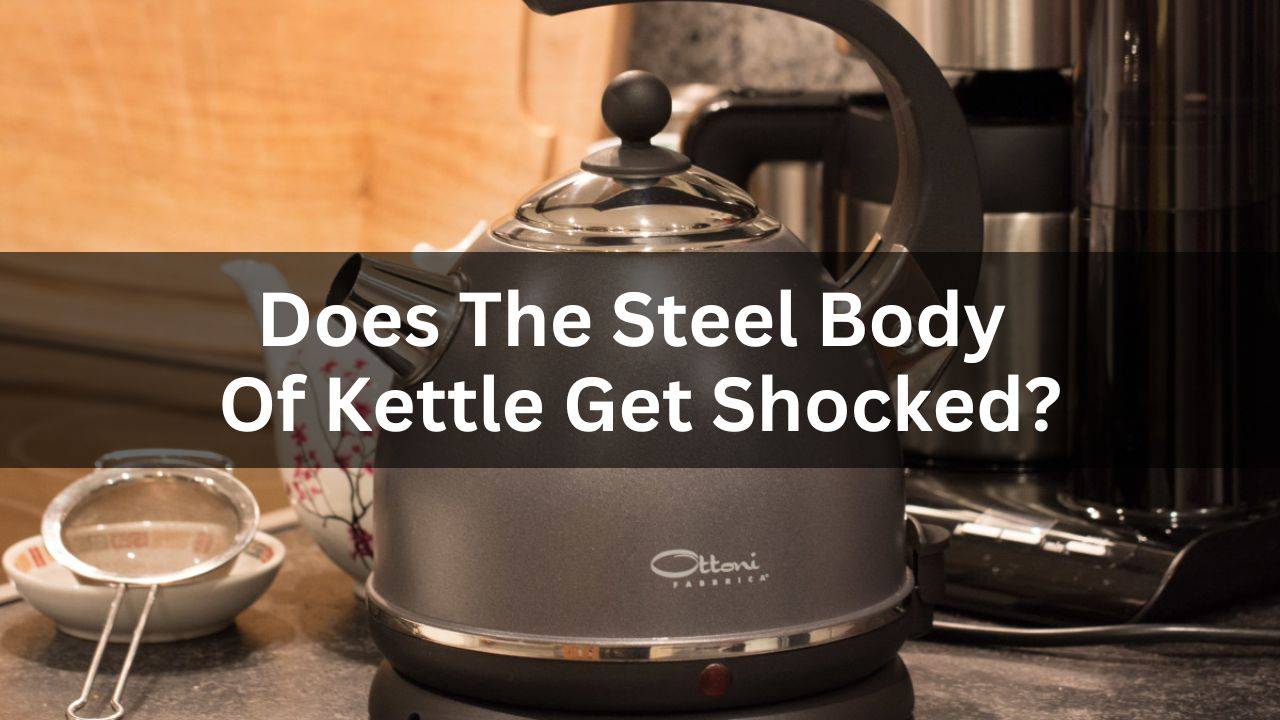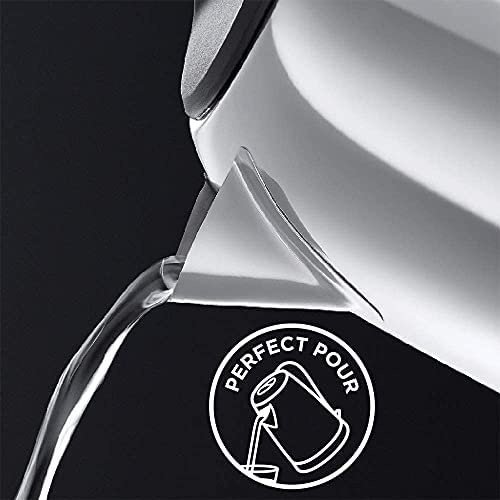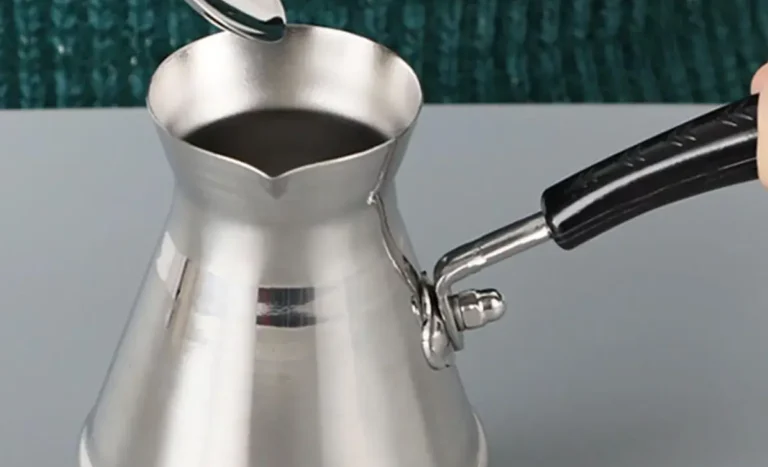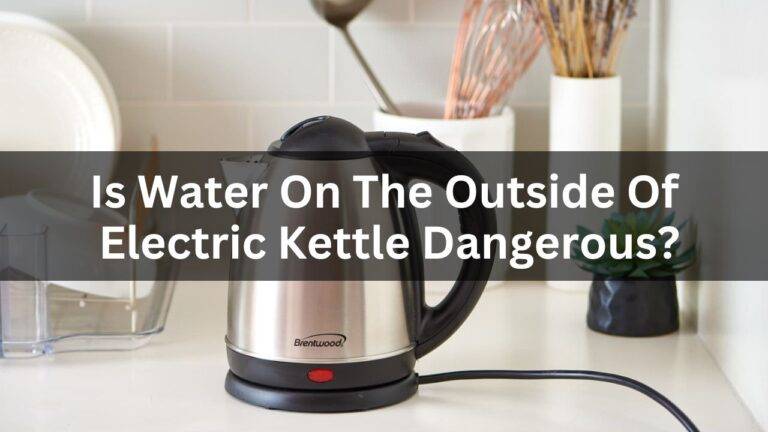Does The Steel Kettle Body Of Get Shocked? 2024-25
Are you using a electric steel kettle and worried it might cause an electrical shock? And that’s why you are afraid to use it.
The answer to this question is No.

Are you using a electric steel kettle and worried it might cause an electrical shock? And that’s why you are afraid to use it.
The answer to this question is No. It never gets shocked in normal circumstances. Because the current has no link with the kettle’s body. The heating element converts current into heat and this heat transfers to water from the metal base.
So if the current is not passing through the body of the kettle, how can you get a shock from it? It will only give you an electrical shock in case of any malfunction in it.
If the wire touches the steel body due to a fault, current can flow through it. In this case, you may feel an electric shock when you touch the electric kettle. After reading this article, you can get the reasons for electric shock from the kettle and safety measures.
Contents
Common Causes of Electric Shocks in Steel Kettles:
In normal cases, an electric kettle consists of an insulator present between the heating element and the body. Due to this, current doesn’t flow between the steel body. But if you are getting an electrical shock from it there could be many reasons.[1]
Faulty Cord:
In case the wire of the electrical body gets damaged somewhere. And if it touches the steel body of the kettle, current can flow in it. Because steel is a very good conductor of electricity. You can get shocked if you touch that kettle.
Damaged Insulation Layer:
Even if its insulation layer is damaged due to aging or any other defect, the current will still flow from the upper steel covering of the kettle. This insulation blocks the way of current between the heating element and the steel body.[2]
Wet Place:
Water is a conductor of electricity. If you put it in a wet place then you can get an electrical shock. Because current can transfer from the base of the kettle to water, and from water to its steel body.[3]
Contact Of Switch With Water:
You can get electrical shock from your steel electrical little if its switch comes in contact with water. That’s why it is always stated that you check your cord and switch before turning on it.[4]
Also Read: Is It Safe To Leave Tea Kettle Plugged In?
What Happens When You Get Shocked From a Steel Kettle?
Depending on the intensity and length of the shock, it can cause various symptoms. Low voltage shock doesn’t affect you badly.

In case you get an electrical shock from a high-voltage steel kettle for a very brief time. You can feel the following symptoms.[5]
- Muscle pain
- Tingling
- Cardiac arrest
- Skin burn
- Unconsciousness
- Seizures
Also Read: Can I Have A Kettle In My University Room?
What Are Safety Measures To Avoid Getting Shocked by Steel Kettle?
By the way, steel electric kettle does not get current quickly because of the insulation. But you should care about safety when you are dealing with electrical appliances.
That’s why you can follow some safety measures to avoid electrical shock from the steel kettle.
- Always buy the double-insulated steel kettle.
- Never leave the electrical kettle unattended.
- Check your cord before turning on the kettle. In case it is worn out or touches the upper body, then don’t turn it on.
- Regularly clean it with safety measures.
- To avoid electrical risks, never submerge any component of the kettle: power base, cord, plug-in water, or any other liquid.
- Try to ground your electrical kettle to avoid any unwanted accidents.
- Don’t use the hard scrubber to clean it. You can destroy the insulation layer present in it. That’s why I use a soft sponge to clean it.[6]
Also Read: Should You Leave Water In A Kettle Overnight?
Why Are Grounding and Insulation Important In Electric Kettles?
You can safely use double-insulated electric kettles without any worry. Manufacturers are putting double insulation between the heating element and the metal body to avoid the electrical shock of the steel body.
The double-insulated appliances are called Class II electrical appliances. Manufacturers put a double insulation layer to protect the user. Electric kettles that have double insulation don’t need grounding.

But sometimes people prefer the grounding of it for safety measures. In earthing the kettle, we simply use earth wire and connect it to the electrical kettle. It protects people from being electrocuted and stops the electrical kettle from going live.[7]
Also Read:
Is It Dangerous To Boil Water In A Plastic Electric Kettle?
How Do You Prevent Kettle From Temperature Swings?
Conclusion:
This article gives you a detailed answer to why you get an electrical shock from a steel kettle and how you can avoid it. You can safely use steel electrical kettles with double insulation layers.
You shouldn’t worry about using it. But as you know precautions are very important when we are dealing with electrical appliances. The steel body of the kettle gets shocked when any malfunction occurs in it or its wire.
You can also get shocked by it in case you are using it in a wet place. A faulty cord could also be a reason for it. If you want to avoid any unwanted situations. You should follow safety precautions when dealing with a metal electrical kettle.
FAQs:
Q: Does a kettle need earthing?
A:It is not necessarily needed because most electric kettles have double insulation. Double insulation saves you from electrical shock. But if you still want to use earth wire, it increases the safety.
Q: Is the water in a kettle electrified?
A:The Current doesn’t pass through the water present in the electrical kettle. Because the heating element converts current into heat by using resistance. This heat passes to water through the base, not the current.
Q: Why is my electric kettle shocking?
A:When we heat the kettle without water. The heating element gets overheated. If It remains unattended for a long time. The heating element starts burning and ultimately it starts melting.
Q: Are electric kettles with steel bodies safe to use?
A:Yes, electric kettles with steel bodies are safe to use when they are in good condition and meet safety standards. Regular maintenance and proper usage help ensure safety.
Q: Can water leakage cause an electric shock from a steel-bodied kettle?
A:Yes, water leakage can potentially compromise the insulation and lead to electric shock hazards. Regularly inspect the kettle for any signs of damage or leakage.
Q: Can the steel body of an electric kettle conduct electricity and cause a shock?
A: In general, the steel body of an electric kettle is not designed to conduct electricity. It is insulated from the electrical components inside to prevent the risk of electric shocks.
Q: Are there specific conditions where the steel body might conduct electricity?
A: Under normal operating conditions, the steel body of a kettle should not conduct electricity. However, if there’s damage to the insulation or internal components, there could be a risk. In such cases, the kettle should be inspected and repaired by a professional.
Q: Can external factors, like water spills, lead to the steel body conducting electricity?
A: Water spills on the outside of the kettle should not cause the steel body to conduct electricity. However, it’s essential to keep the kettle dry and address any water spills promptly to prevent potential safety hazards.
Q: How can I ensure the steel body of my kettle remains safe to touch?
A: Regularly inspect the kettle for any visible damage, ensure it is properly maintained according to the manufacturer’s guidelines, and promptly address any issues that may arise.
Q: Can using the kettle in a wet environment pose a risk of electric shock?
A: Using an electric kettle in a wet environment increases the risk of electric shock. It’s crucial to operate the kettle in a dry area and follow safety guidelines to minimize potential hazards.
Q: Should I unplug the kettle when not in use to avoid any risk of electric shock?
A: Unplugging the kettle when not in use is a good safety practice. It ensures that no electricity is flowing through the kettle, reducing the risk of potential shocks.
Q: What should I do if I feel a shock when touching the steel body of the kettle?
A: If you ever feel a shock when touching the kettle, stop using it immediately and unplug it. Contact the manufacturer for guidance or seek professional assistance to inspect and repair the kettle.
Q: Are there safety certifications or standards for electric kettles to prevent shocks?
A: Electric kettles are often designed and tested to meet safety standards and certifications. Look for kettles that comply with relevant electrical safety regulations to ensure a higher level of protection against electric shocks.
Q: Can using a voltage converter or adapter affect the risk of electric shock?
A: Using a voltage converter or adapter should not affect the risk of electric shock if the kettle is designed for the specific voltage in your location. Always follow the manufacturer’s recommendations regarding electrical compatibility.
Q: Can I use distilled water in my steam iron to prevent mineral deposits?
A: While distilled water can reduce mineral buildup in your steam iron, it’s essential to check the manufacturer’s recommendations. Some irons may require a mix of distilled and tap water for optimal performance.
Q: How can I prevent my wooden cutting board from developing cracks?
A: Wooden cutting boards can crack due to moisture fluctuations. To prevent this, oil your cutting board regularly with food-grade mineral oil or beeswax, and avoid exposing it to extreme temperature and humidity changes.
Article you might be interested:
Why Is My Kettle Making A Buzzing Sound?
Do You Use Bottled Water To Boil The Kettle?






